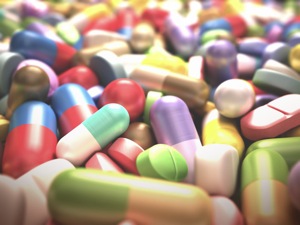
Although diet obviously plays a role in leaky gut, so do other factors, such as high blood sugar, chronic stress, and hormonal imbalances. However, it's important not to overlook the impact of seemingly innocuous over-the-counter (OTC) medications, as well as some prescription ones.
Leaky gut, or intestinal permeability, is a condition in which the walls of the small intestine become inflamed, damaged, and porous, allowing undigested foods, bacteria, yeast, and other pathogens into the bloodstream. Once these pathogens escape the confines of the intestines and hit the bloodstream, they trigger inflammation in the body and brain. Leaky gut is associated with chronic disease, autoimmunity, depression, and more. Common symptoms include joint pain, skin conditions, gut problems, fatigue, and depression and other brain-based disorders.
In addition to following a leaky gut diet, you can repair your gut and lower inflammation by eating a diet that stabilizes your blood sugar, taking measures to reduce physical and mental stress, and being aware of which medications could be making your leaky gut worse.
Medications that can cause leaky gut
Corticosteroids: Steroid drugs such as prednisone suppress the immune system and dampen inflammation. While they may be life saving or necessary, they also can contribute to leaky gut. This is because they raise cortisol, which in high doses breaks down the gut lining. This is why chronic stress, which also raises cortisol, contributes to leaky gut as well.
Non-steroidal anti-inflammatory drugs (NSAIDs): NSAIDs such as ibuprofen and aspirin have been shown to increase intestinal permeability within 24 hours of use and long-term use can contribute to a leaky gut condition.
Antibiotics: Antibiotics wipe out the beneficial gut flora, which can lead to leaky gut. It's important to always follow up antibiotic use with probiotics to reinoculate the gut.
Chemotherapy drugs: Chemotherapy drugs can lead to leaky gut by degrading the intestinal barrier.
All of these drugs have their purpose and you should not put yourself or a child in danger by avoiding a lifesaving drug in order to prevent leaky gut. However, if they're necessary, you may want to consider following their use with a leaky gut protocol to restore the intestinal lining and prevent a worsening of your health.
Ask my office for more information on how to repair leaky gut.



Latest from the Blog
The Death of Red Dye #3
January 15, 2025What Is Red Dye No. 3? Red Dye No. 3, or Erythrosine, is a synthetic food color derived from coal tar. It was first approved by the FDA in the 1950s and quickly became one of the most popular artificial colors in food and cosmetics. Red Dye No. 3 was used in everything from candies, […] Read more
Latest from the Blog
Do You Know What Is In Your Protein Powder?
What’s Really in Your Protein Powder? Understanding the Risks Protein powders are a staple in many health-conscious diets, from athletes seeking muscle recovery to those simply aiming to boost their daily protein intake. With a wide variety of options available, choosing the right one can feel overwhelming. However, recent findings have raised concerns about what’s […] Read more